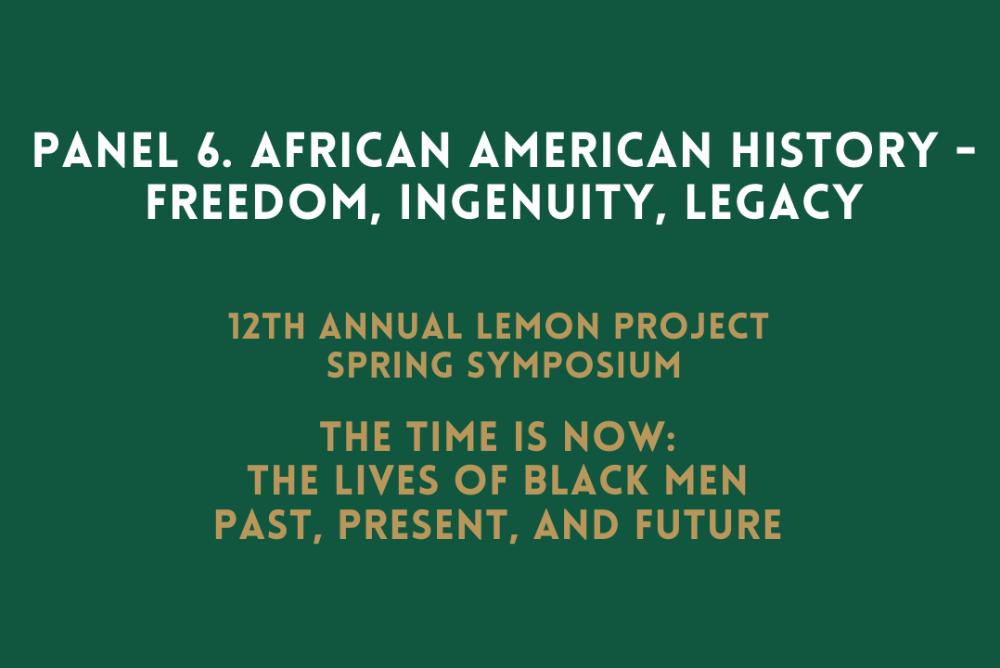Diversity & Inclusion Events
[PAST EVENT] 12th Annual Lemon Project Spring Panel 6. African American History - Freedom, Ingenuity, Legacy
Location
School of Education, In person at Dogwood Room and Virtual over Zoom301 Monticello Ave
Williamsburg, VA 23185Map this location
Access & Features
- Free food
- Open to the public
- Registration/RSVP

Panel 6. African American History - Freedom, Ingenuity, Legacy
12th Annual Lemon Project Spring Symposium
To join us in person, please register here.
To join us virtually, please register here.
Adrienne Fikes, M.Ed, PCC, (she, her) the Soul Power Coach?™, "He Went To See A Man About A Horse": Discovering my great-grandfather in the genealogical treasure trove of information in Virginia’s Central State Hospital records
The story of when and why my great-grandfather left his wife and children is a story of Black men and mental health. The oral history says my grandmother was a young girl when her father went to see a man about a horse. He never came home.
My family history research identified a succession of hardships and losses that my great-grandfather endured before disappearing. This presentation will share the deep joy of finding my great-grandfather through genealogy research, and discuss the ongoing effort to protect and preserve the 800,000 records encapsulating the 152-year-old history of the Virginia’s Central State Hospital archives. I will share the impact of this discovery on my great-grandfather’s descendants, and highlight the opportunity for families across Virginia to honor the dignity and humanity of their ancestors by accessing these files.
The information contained in my great-grandfather’s patient file demonstrates the priceless details available in this unique record set, and the importance of the ongoing effort to protect and preserve what Archivist King Davis, Ph.D describes as “the most valuable set of records in the world as far as Black people in the mental health system.”
Ervin L. Jordan, (he, him) Associate Professor and Research Archivist, University of Virginia, 'A Wealthy Colored Citizen’: John Adams, Free & Black in Richmond, Virginia, 1840s-1870s
This paper will evaluate free Black family patriarch John Adams (1825-1873), a self-employed building contractor and plasterer in antebellum Richmond, Virginia. Although considered among the state’s wealthiest African-Americans at the time of his death, he and his family have experienced historical obscurity with the exception of passing references in monographs and biographical sketches of his youngest son John Henry Adams (1848-1934), a Richmond city alderman and contractor in his own right. John Senior and other members of the family (mostly his sons) are represented by personal, financial and legal documents. The collection is historically significant inasmuch as comparatively few manuscript collections of nineteenth-century free Black Virginian families have survived. Additionally, this presentation will summarize the remarkable circumstances of the Adams papers’ 1990s rediscovery and rescue, acquisition and potential research value.
Rachael Finch, (she/her) Senior Director of Preservation & Education, Heritage Foundation of Williamson County, TN, Enslaved to Enlisted Men: Rising Up to Rediscover Connections of United States Colored Troops to the Franklin Race Riot 1867 in Williamson County, Tennessee
The close of the American Civil War in 1865 brought rapid restructuring to the Tennessee heartland’s society and cultural landscapes. The black populations of the region’s towns and cities burgeoned as large numbers of freedmen eschewed rural areas in favor of new opportunities in urban centers, establishing a cultural presence for themselves, creating vibrant communities that challenged the nature of existing cultural landscapes and demanding civil rights. In 1867, racial tensions erupted into violence in Franklin, the seat of Williamson County, when members of the Colored League, an organization promoting civil rights for blacks, clashed with a group of armed local white men, many of whom were ex-Confederates. This presentation examines the 1867 Franklin Race Riot with special attention given to the development of African American communities in the years shortly before and after the incident. It seeks to determine why Franklin’s black communities sprung up where they did and what effects they had on the town’s existing cultural landscapes. Personal testimonies from several Black men will highlight the cultural realities but also their resilience in a racist society and highlight the recent placement of educational markers detailing these strong men and their story interpreted in a public space within today’s cultural landscape.
Jackson Elliott Cantrell, (He, his, him) Undergraduate Student, Florida State University International Programs: Florence, Italy, Antebellum Talents: The Men of Fontainebleau Plantation
When the state-of-the-art industrial park fired up its massive operations, manufacturers from across Louisiana and beyond admired and later copied the endeavor. Its new technology, unique design, and year-round productivity were enhanced by a supply chain system that reliably delivered products across the globe. The site operated as a transportation hub for building materials and sugar but also for luxury goods imported through the port of New Orleans. Fontainebleau Plantation, now a state park, contained a self-sustaining village and hospital. Its artisans offered client services in masonry, architecture, and garden design. A pastry chef and fresco painter rounded out their offerings. That this impressive operation was conducted entirely by enslaved individuals broke stereotypes in 1800s Louisiana. Today, a look back at the talents of both enslaved and free men of color challenges contemporary assumptions as well.
Contact
[[setho2, Sarah Thomas]]
